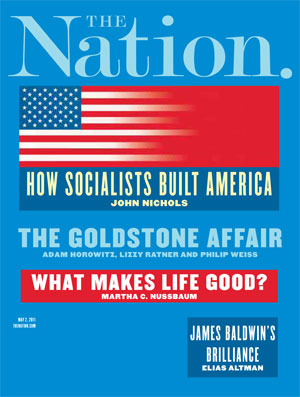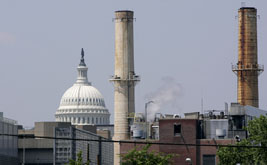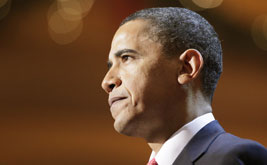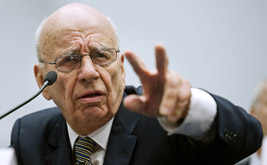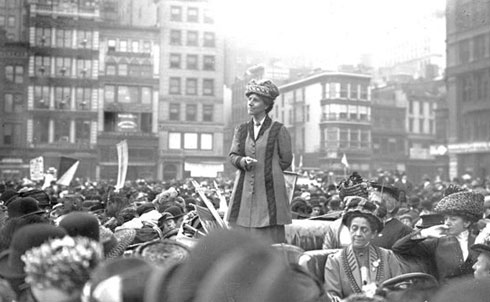¡Baja Libre! for the Real Arizonans
Thank you for noting our Baja Arizona movement [“Noted,” April 4]. One small quibble: since the term “secession” has some unpalatable history, we prefer “separation.” Our model is West Virginia, which separated in order to stay in the Union when Virginia seceded. We have a drink too, the Baja Libre. It’s tequila and Squirt. Don’t waste the boutique stuff in these; any cheap tequila blanca will do. ¡Salud!
BILL MILLER
The Insanity of the Nuclear Age
Mineola, N.Y.
As Japan reels from the cataclysm of earthquakes and the tsunami—and the greatest nuclear disaster since Chernobyl—Jonathan Schell’s linkage of the horrors of Hiroshima and Nagasaki with the folly of Fukushima should serve as a cautionary tale about militarism, the nature of war and the dangers of nuclear proliferation [“From Hiroshima to Fukushima,” April 4]. Although more than six decades have elapsed since President Truman ordered the atomic bombardment of two densely populated Japanese cities in World War II, we are still haunted by this mass incineration of civilians.
When Italian physicist Enrico Fermi produced the world’s first controlled, self-sustaining nuclear chain reaction on December 2, 1942, the objective was the disruption and elimination of Nazi Germany’s war machine—not the wholesale eradication of noncombatants. Nuclear energy is a fact of life in the Land of the Rising Sun, and Japan has borne the brunt of yet another atomic tragedy.
ROSARIO A. IACONIS
West Kingston, R.I.
Jonathan Schell’s conclusions on the nature of nuclear crises are biblical. This is what we get for fooling with nature. We humans are tropical animals, akin to monkeys and chimps. It is not a great step from fireplaces to steam engines to nuclear power. Each of these methods of creating heat and fuel is severely flawed and unsustainable.
If we are doomed for fooling with nature and taking on necessities too complex to handle, then we were doomed 1 million years ago when we conquered fire. The control of fire ultimately resulted in our taking over the planet. I suppose one could argue about whether that was a good thing, especially for the other living things on the earth. But the alternative was to remain in the tropics as just another group of quarreling smart apes.
I think of the human species in classical Greek terms. Our nature contains our strengths, beauty and incredible creativity; also the seeds of our destruction through arrogance and greed. We can do nothing but appreciate this fact and try to overcome as we watch and suffer and feel sorrow for our fateful limitations.
MARQUISA LaVELLE
The Legacy of the Triangle Fire
Brooklyn, N.Y.
Joshua Freeman, in “Remembering the Triangle Fire” [April 4], did not mention a major change in worker protection inspired by the fire. The day before the fire the New York Court of Appeals declared the state’s first workers’ compensation law unconstitutional. It took until July 1, 1914, three years after the fire, before a new law would come into effect, after amending the New York State Constitution.
RONALD BALTER
New York City
My grandfather, Benjamin Schlesinger, was president of the International Ladies Garment Workers Union in 1903, when he was only 27, then president in 1914–23 and again in 1928–32. At the time of the Triangle fire he was manager of the Jewish daily Forward. My mother often quoted him: “Live a life of social significance!” When his wife complained that they were living in a fourth-floor walk-up in the Bronx and she had to shlep carriages, etc. for three small children, Grandpa would say, “When all the workers live in an elevator building, we will live in one too.”
So much has been written about the Triangle fire. Less known is the role of women in the history of the ILGWU. By and large, these very young women, girls as young as 14, came from Eastern Europe. Most were Jewish and lived on Manhattan’s Lower East Side. Through these shared experiences the women developed a loyalty to one another, and, as Joshua Freeman notes, a passion to work together. One of them, Clara Lemlich, who had been beaten up on the picket line, called for a general strike. The “Uprising of the Twenty Thousand” followed.
The kind of unity that developed among these women workers is, I believe, unique. Yes, today’s feminists work together and have accomplished much. And there are women today serving as mentors to younger women just beginning their careers.
But we come from all over, speak different languages, have various levels of education—these differences make it difficult for me to imagine a feminist leader calling for a strike today that would be followed by a walkout of 20,000 women.
Now and then, I wish I had lived at the time of Clara Lemlich, especially now when “labor” is a bad word and belonging to a union is treated as if it were a crime. “Labor” was a bad word then, too, and belonging to a union was a crime. But the women went on strike, and bit by bit the unions and the nation grew stronger.
JUDITH S. ANTROBUS
New York City
My mother, Rhoda Rothman Gladstone, lived through the Triangle fire, 100 years ago, by hiding in a closet.
MORTON GLADSTONE
The F-word
Highland, N.Y.
I’m a retired teacher and after I finish reading your wonderful publication, I donate it to my former high school’s library. So that is the reason for this request; not for censorship. You do not use the F-word gratuitously, and I am not offended by it. But I fear a parent may complain and your valuable publication would be taken away from those youngsters, who would benefit from the progressive point of view. Perhaps you could print that word like this: f**k.
JOE DiBLANCA
We understand your dilemma, and also that well-intentioned but unenlightened parents sometimes call for censorship. But we also see “f**k” as censorship, a euphemism that weakens language and is a tool of hypocrisy. We’d like the kids to see this word used “properly.” If the parents remove the magazine, the kids will lose. But either way they lose. —The Editors
No More Bottom of the Bird Cage
Northglenn, Colo.
How to recycle your Nation magazine:
1. Remove your name and address label to protect your privacy.
2. Place a sticker on the front instructing others to also recycle by passing the magazine along.
3. Make sure the subscription address and phone number are prominent.
4. Leave copies at the airport, and in your doctor’s, dentist’s and other waiting rooms so others can learn about The Nation.
GARY COXA
‘Death to PBS and Planned Parenthood!’
St. James, Mo.
While we supposedly fight to eradicate the Taliban and their oppressive Sharia law
in Afghanistan, the “Tea-liban” and their oppressive law take over our country!
DON THOMANN Read More
Our Readers
